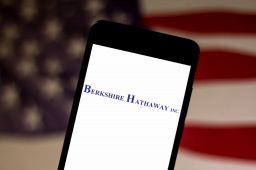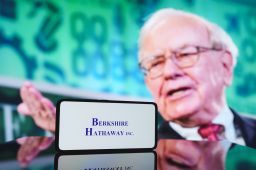Why Buffett is buying what everyone else is selling (Again…)
Warren Buffett just made a $1.6 billion investment on a company drowning in scandal.Past performance isn’t a reliable indicator of future results
His firm, Berkshire Hathaway, has quietly bought over 5 million shares of this struggling stock since Q4 2024 and kept it secret for months to prevent an army of copycat investors from driving up the price. Sure enough, once the news broke, that's just what happened. The company's price shot up by 10%.
Snapping up undervalued companies when they're in distress is Buffett's forte
It's this bold instinct that has built Berkshire Hathaway into one of the most successful holding companies ever. This is exactly what he did with Goldman Sachs during the 2008 financial crisis. He invested $5 billion into the bank when most others wouldn't go near it. And his daring move paid off big time when Goldman Sachs redeemed those shares in 2011. Buffett made $3.7 billion. And he may be doing it again.
That controversial company he's been quietly buying stock in is United Health Group, America's largest health insurer and the world's seventh-largest company by revenue. They've dominated the sector for decades, but lately they've hit treacherous waters and their stock prices tanked, falling by a whopping 60% between April and August of this year. It started with a major earnings miss driven by unexpectedly high medical costs that spooked Wall Street and triggered a big sell-off.
Then came the scandals. The company is facing a sweeping Department of Justice investigation into its billing practices. It's also reeling from the shocking murder of their CEO, Brian Thompson, in New York last December, which brought a firestorm of negative press focusing on United Healthcare’s high rejection rates for insurance claims. Turbulent times for a scandal-ridden company.
Investors are now asking a critical question
Do these deep-seated problems create a once-in-a-decade buying opportunity, or do they point to a company that's fundamentally broken? Buffett seems to have an answer, but this investment in UNH looks eerily similar to one of his rare but huge mistakes—an investment that cost him over $444 million and he later admitted he was dead wrong about.
From a classic value investing perspective, the argument to buy UNH is compelling. First of all, it's a powerhouse. United Healthcare is the largest healthcare company by market cap, bigger than the next three combined. UNH also owns Optum, a sprawling and fast-growing healthcare services arm that provides everything from data analytics to pharmacy benefits. Together, these businesses tap into the massive non-negotiable demand for healthcare in America.
After its steep decline, the company is now trading at a PE ratio of around 13. That's sharply down from nearly 38 last year and well below its 5-year average of 29. This puts UNH at the lowest PE ratio out of the top 10 biggest healthcare companies. For a value hunter like Buffett, that's a clear signal of potential undervaluation. So Buffett's investment signals confidence that the troubles facing this healthcare giant are temporary headwinds, not a permanent breakdown.
If UNH can get its costs under control and navigate its legal troubles, the stock could be poised for a major rebound. But that's a big if, especially when you consider the parallels to one of Buffett's worst ever trades, which we'll get to soon. The biggest cloud hanging over the company is the DOJ investigation into their billing practices. Regulatory probes are notoriously unpredictable. A worst-case scenario could involve billions of dollars in fines and painful restrictions on their operations.
Medical price inflation is expected to hover around 8.5% in 2025 and 2026. This trend continues to squeeze profit margins and there's no guarantee the company can fully price in these higher expenses. Finally, the reputational damage from the public backlash and constant negative headlines adds another layer of uncertainty. These factors could trap investors in a prolonged decline, which is exactly what happened to Buffett once before.
The situation at UNH today looks remarkably similar to Buffett's investment in Tesco plc
This is that huge mistake we've been alluding to. Buffett built up a 5% stake in Tesco between 2006 and 2012. He trimmed that holding in 2013 after souring on the company's management, but he still held over 300 million shares when things went south.
In 2014, the UK grocery giant was hit by a massive accounting scandal for overstating its profits. This caused its stock to collapse by nearly 50%, leading to the company having to pay hundreds of millions of dollars in fines. The parallels to UNH are striking. Tesco was an established industry leader just like UNH. Both came under intense regulatory scrutiny for financial misrepresentation. And in both cases, Buffett stepped in as a value buyer of a great company that had been unfairly punished for a fixable problem.
But with Tesco, Buffett was wrong. The company's problems were deeper than he realized, and it continued to lose market share. Buffett later admitted he was too slow to sell—a delay he called a huge mistake that ultimately cost his shareholders over $440 million. The question now is whether UNH's DOJ probe could expose similar deep-seated issues and turn this investment into Tesco 2.0.
So, where does that leave us?
The bullish view rests on UNH's immense scale, its discounted valuation, and Buffett's incredible track record of making winning bets on distressed giants like his 2008 Goldman Sachs deal. If you trust the Oracle of Omaha, this is a trade on a market leader weathering a temporary storm.
The bearish side, however, warns of persistent regulatory and financial risks that can't be ignored. This view is amplified by the chilling parallel to Tesco—a case where Buffett's hesitation in the face of mounting warnings led to one of his biggest losses. Ultimately, history shows that Buffett often wins these kinds of bets. But the success of this trade hinges entirely on the resolution of the DOJ investigation and whether UNH can get its earnings back on track.
For now, it remains a high-stakes bet on a fallen giant with billions of dollars hanging in the balance. At Capital.com, we'll keep you updated on Warren Buffett's latest moves and other major market trends. Explore more insights in our Educational Hub.

